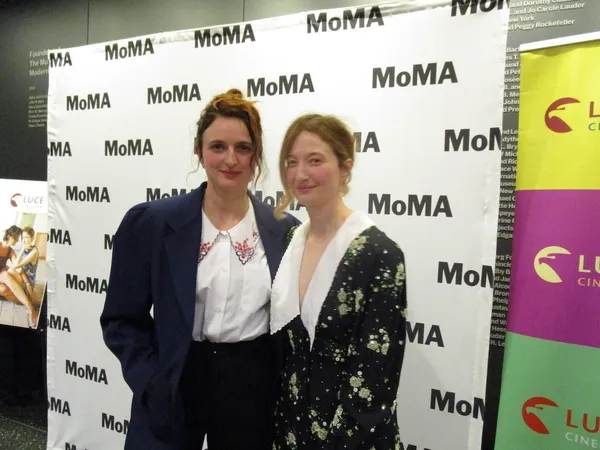 |
| Corpo Celeste (Heavenly Body), Le Meravigile (The Wonders) and Lazzaro Felice (Happy As Lazzaro) director/screenwriter Alice Rohrwacher with Alba Rohrwacher Photo: Anne-Katrin Titze |
Cannes Best Screenplay winner Happy As Lazzaro (Lazzaro Felice), shot by Hélène Louvart, executive produced by Martin Scorsese, and starring Adriano Tardiolo with Alba Rohrwacher, Luca Chikovani, Agnese Graziani, David Bennent, Nicoletta Braschi, Sergi López, and Tommaso Ragno, was the opening night film in The Wonders: Alice and Alba Rohrwacher, organised by Museum of Modern Art Department of Film Curator
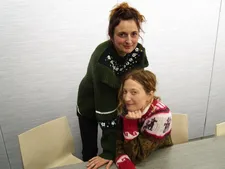 |
| Alice Rohrwacher with Alba Rohrwacher: “I think fairy tales were very important for us. Especially the collection of Italian folktales done by Italo Calvino.” Photo: Anne-Katrin Titze |
The casting of David Bennent (Volker Schlöndorff’s adaptation of Günter Grass’s The Tin Drum), the magic of Italo Calvino (Italian Folktales), Astrid Lindgren (Ronja, Räubertochter), Angela Carter (The Donkey Prince), Jacques Demy (Peau D'Âne) and helicopters, the importance of storytelling and being in another time - all were discussed in the second half of my conversation with director/screenwriter Alice Rohrwacher.
Anne-Katrin Titze: I was reminded of the story of Rip Van Winkle. Lazzaro also returns unchanged while the rest of the world was affected by the passing of time. The robbers reminded me of Pinocchio.
Alice Rohrwacher: Yes!
AKT: Even the casting. You have David Bennent!
AR: From The Tin Drum.
AKT: That's a most magical appearance. Actors do carry their past roles with them.
AR: Yes, all the characters are like from fairy tales. Everyone, also Nicoletta Braschi. And also the extras, we looked for extras that are like out of a fairy tale.
AKT: Even the way you use religion seems to be the way folktales use religion. God just walks by and Jesus can be on 54th Street and you can encounter the Virgin Mary at the market. Did you grow up with fairy tales? Was that big for the two of you [Alice and Alba]?
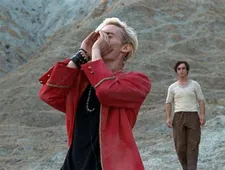 |
| Tancredi (Luca Chikovani) with Lazzaro (Adriano Tardiolo) in Happy As Lazzaro (Lazzaro Felice) |
AR: Yes, I think fairy tales were very important for us. Especially the collection of Italian folktales done by Italo Calvino. That's a book, two books, that we always had with us. And still now. And what is so incredible about these tales is that the protagonists are most of the time very simple people. It's not a princess or a king.
AKT: I, too, have the Calvino book at home, on my nightstand.
AR: Many times it's very simple people that have to talk with God or a giant. And also when they are king or princess, they are never rich. It's a very common person, and this is very specific from Italy, no? All the magic parts of the fairy tales came in a natural way. The door between reality and magic is always open. It's never closed and not a door that we have to look for and then we have to open. It's there.
AKT: It's one dimensional. Everything happens in the same dimension.
AR: Yes, it's always one dimension. I think it's because we live in a country - for example in my region, which is the Etruscan region - where all the times are connected. Every time you walk in a street, physically, you have past, all the past and present, everything together. You take a stone and the stone has all the lines of all the times. So we have a different feeling of time, no? Everything is full of past. And it's not separate.
AKT: A line from the Calvino book that stayed with me is an old Tuscan proverb, stating that if you don't add anything to a tale, it's no longer beautiful. There has to be a constant re-inventing. Re-inventing Lazzaro …
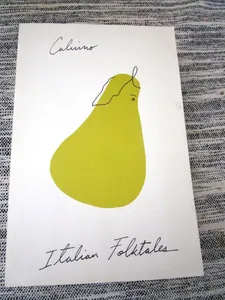 |
| Anne-Katrin Titze’s copy of Italo Calvino's Italian Folktales Photo: Anne-Katrin Titze |
AR: One funny thing - for the peasants, Lazzaro became a traditional hero. Even though it was a movie. They did a song, a popular song and it's in the end credits. They are singing it and we recorded while they were singing this song about Lazzaro. Lazzaro became a traditional hero for them. They didn't know anything about the story of the movie, but when we were working, Lazzaro became traditional.
AKT: That's terrific!
AR: And the end song - the character of Catirre together with all the other peasants, they did this song in a traditional way of singing with improvisation about Lazzaro.
AKT: This says it all. You invented a tradition! The moment when the helicopter arrives, I thought about Jacques Demy's Peau d’Âne. A different use of the helicopter, as it turns out. I don't know if you remember, but at the end of his film he has the helicopter land in the fairy-tale world.
AR: Yes, I remember.
AKT: And in your case, this arrival opens up all the history of what actually happened there. When Lazzaro right after walks to the overgrown castle, again, I thought of the same film.
AR: I didn't think about it, but now I do. Many times we are not conscious of everything. What I knew is when Lazzaro dies, the only way to continue the movie was: don't stay with the pain and shock. It's true, to move to another level of the story, of the narration, you can't continue like this. The character dies and you have to go to a different level.
AKT: With the voice-over?
 |
| Alice Rohrwacher on Lazzaro (Adriano Tardiolo): “In the past they believed in his purity and took advantage of it, and in the present they don't see it and he becomes suspicious.” |
AR: Yes, with the storytelling. With the fairy tale. When Antonia starts to talk about this fairy tale, the helicopter is coming, and the police is coming. And then we are in another time.
AKT: Lazzaro, the name, is shouted so often, constantly. In the biblical story, Jesus calls the name. He brings Lazzaro back from death by calling his name. Did you have the "name-calling" counted in the script?
AR: Yes, it was telling about all the people calling at this character. What we do in front of the purity of this soul. In front of an angel. Maybe in the past they used this angel to help them. So they call him to help. And in the present, we don't believe he is an angel. In the bank they don't believe he is a good man.
AKT: And they don't call him by his name.
AR: So the difference is that in the past they believed in his purity and took advantage of it, and in the present they don't see it and he becomes suspicious.
AKT: The hiding place, the cave where Lazzaro and Tancredi are hiding, reminded me of a book I had as a child. I think it was a Swedish book about a little girl and her donkey. And she left her family with the donkey and they were hiding in a cave just like the one in your film. I loved that book.
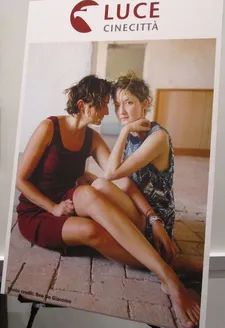 |
| The Wonders: Alice and Alba Rohrwacher at the Museum of Modern Art in New York Photo: Anne-Katrin Titze |
AR: A donkey? I don't know. But there is a Swedish book that I loved a lot, a lot, that is Ronja, Räubertochter [Ronia, The Robber's Daughter].
AKT: Yes, that's Astrid Lindgren?
AR: Yes. It's so beautiful. It's my favourite book.
AKT: Do you know The Donkey Prince, by Angela Carter?
AR: No. It's so beautiful to talk with you because many times we make a movie as we make a dream. And then when you talk to someone about the dream, and they say ah, yes. But when someone really catches the secret message, you feel like, oh, you can't believe it!
Read what Alba Rohrwacher had to say on Marco Bellocchio, Daughter Of Mine, Lucia's Grace, and storytelling with her sister Alice Rohrwacher.
Read what Alba Rohrwacher had to say on Adam Driver in Saverio Costanzo’s Hungry Hearts, Arnaud Desplechin, Isabelle Huppert on shoes, and Sworn Virgin.
Read what Alice Rohrwacher had to say on Happy As Lazzaro (Lazzaro Felice) before The Wonders: Alice and Alba Rohrwacher at the Museum of Modern Art.
The Wonders: Alice and Alba Rohrwacher retrospective runs through December 23 at the Debra and Leon Black Family Film Center.





















